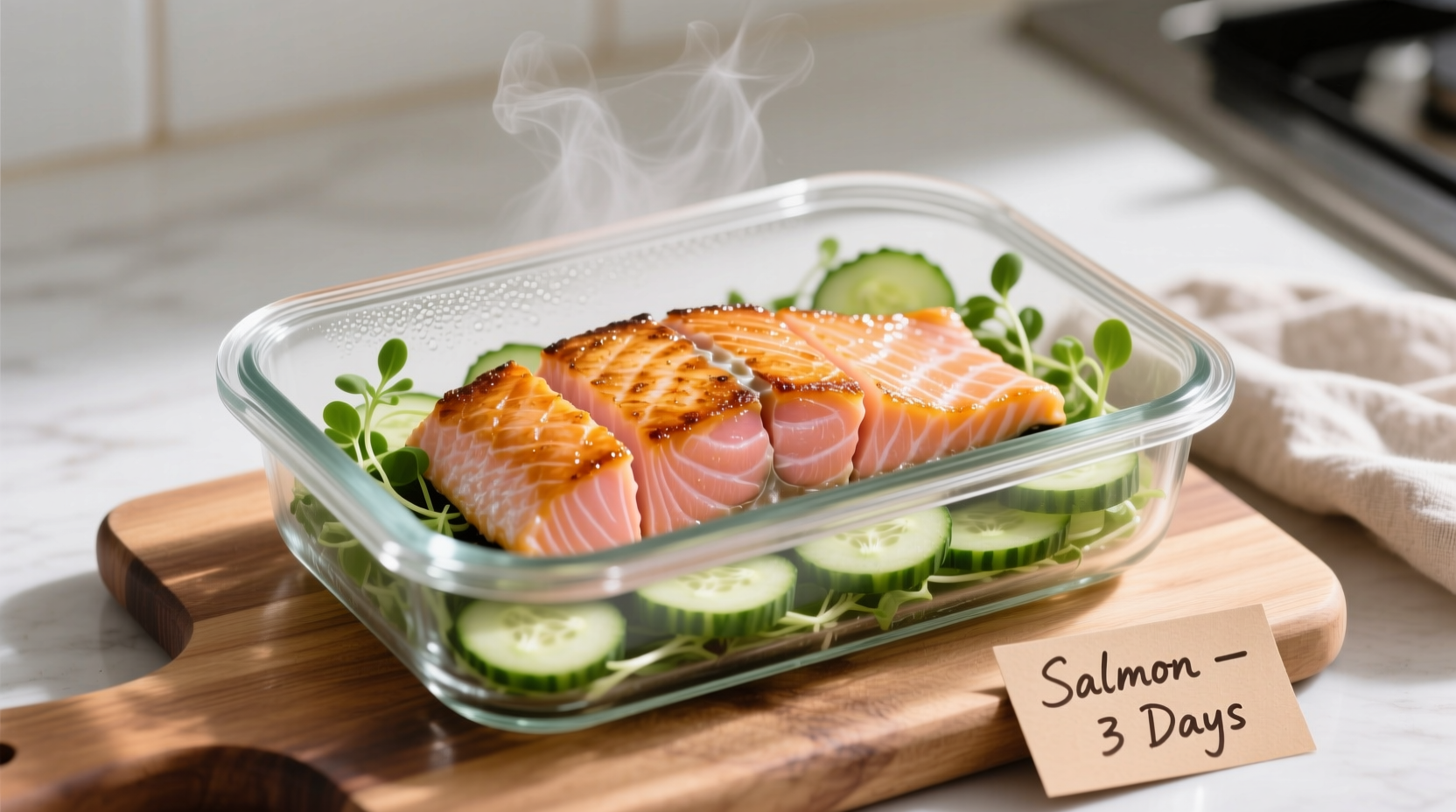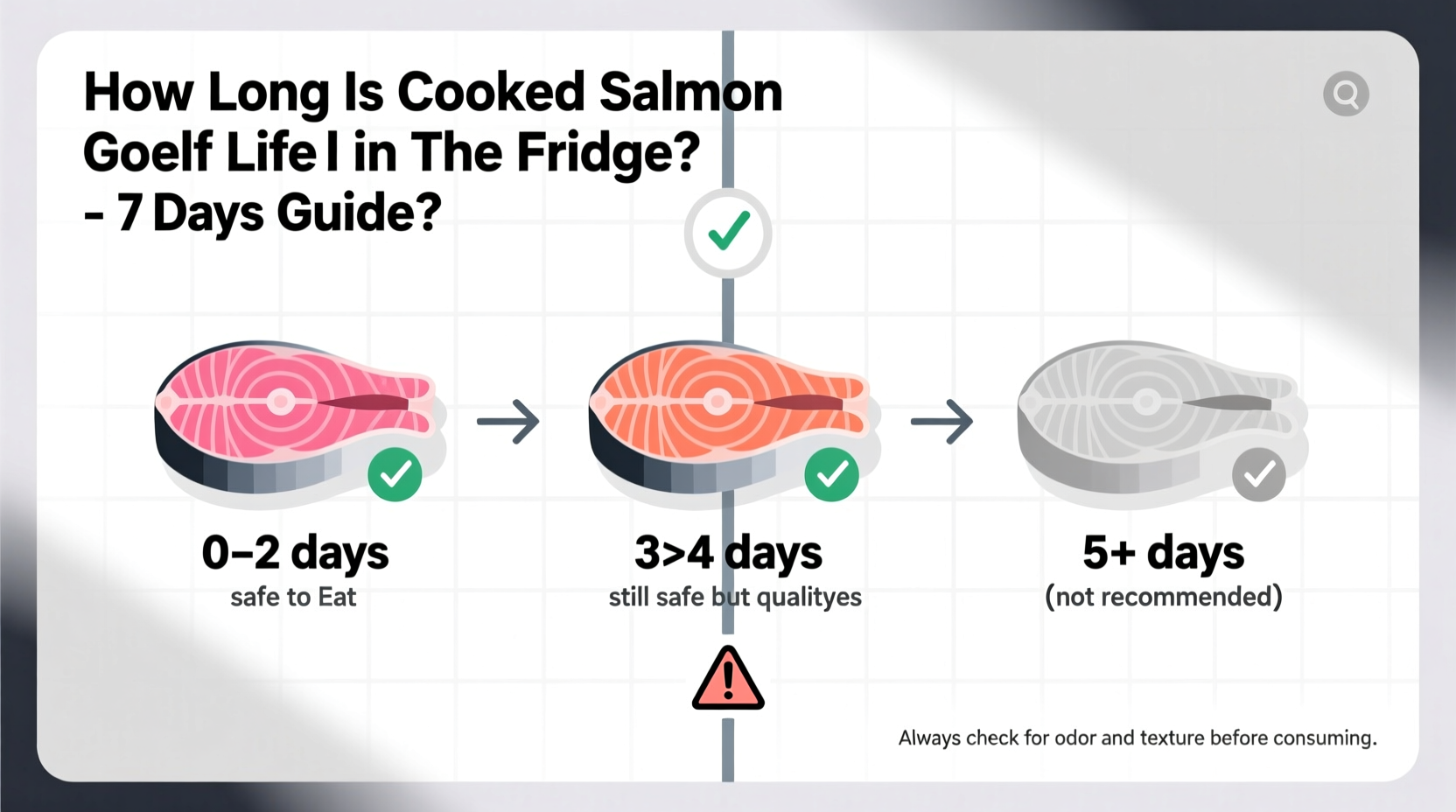Understanding proper storage for cooked salmon isn't just about following arbitrary timelines—it's about protecting your health while minimizing food waste. As someone who's worked in professional kitchens for over 15 years, I've seen how proper food handling practices make the difference between a safe, delicious meal and a potential health hazard.
Why Cooked Salmon Has a Short Refrigeration Window
Fish spoils faster than other proteins due to its delicate structure and high moisture content. The USDA Food Safety and Inspection Service confirms that cooked fish, including salmon, should be consumed within 3-4 days when refrigerated properly. This shorter timeframe compared to other cooked meats (like chicken or beef, which last 3-4 days) stems from fish's higher fat content and susceptibility to bacterial growth.
According to the FDA Food Code, the "danger zone" for bacterial growth spans from 40°F to 140°F (4°C to 60°C). Within this range, bacteria can double in number every 20 minutes. Salmon's rich omega-3 content creates an ideal environment for pathogens when temperature control fails.
Maximizing Freshness: Storage Best Practices
How you store your cooked salmon directly impacts how long it remains safe to eat. Follow these evidence-based methods to ensure maximum freshness:
- Cool rapidly: Transfer cooked salmon to the refrigerator within two hours of cooking (one hour if room temperature exceeds 90°F/32°C)
- Air-tight containers: Use glass or BPA-free plastic containers with tight-fitting lids
- Shallow storage: Store in layers no thicker than 2 inches to promote even cooling
- Refrigerator placement: Store on middle shelves, not in the door where temperature fluctuates
Research from the Colorado State University Extension shows that proper cooling techniques can extend the safe consumption window by up to 12 hours compared to improper methods. Never place hot salmon directly in the refrigerator, as this raises the internal temperature of your appliance and jeopardizes other stored foods.

When the 3-4 Day Rule Doesn't Apply: Context Boundaries
While the standard recommendation is 3-4 days, certain conditions can shorten or extend this window:
| Condition | Effect on Shelf Life | Recommended Action |
|---|---|---|
| Cooked with acidic ingredients (lemon, vinegar) | May extend by 12-24 hours | Still consume within 4 days maximum |
| Left at room temperature >2 hours | Immediately unsafe | Discard immediately |
| Refrigerator temperature >40°F | Reduces shelf life by 24-48 hours | Use thermometer to verify temp |
| Vacuum-sealed storage | Extends to 5-7 days | Only with proper equipment |
How to Identify Spoiled Cooked Salmon
Before consuming leftover salmon, perform these safety checks:
- Smell test: Fresh cooked salmon has a mild ocean scent. Discard if you detect sour, ammonia-like, or overly fishy odors
- Visual inspection: Look for grayish discoloration, slimy film, or visible mold growth
- Texture check: Properly stored salmon should maintain firmness. Discard if it feels mushy or slimy
- Time verification: Always track storage duration using a label with cooking date
The World Health Organization reports that foodborne illnesses affect 600 million people globally each year. When in doubt about your salmon's safety, follow the food safety maxim: "When uncertain, throw it out." Never taste food to determine if it's spoiled, as even small amounts of certain bacteria can cause illness.
Extending Shelf Life Through Freezing
If you won't consume your cooked salmon within 3-4 days, freezing preserves both safety and quality:
- Wrap tightly in moisture-proof material or use vacuum-sealed bags
- Label with contents and date
- Store at 0°F (-18°C) or below
- Consume within 4-6 months for best quality
When thawing frozen cooked salmon, always use refrigerator thawing (never room temperature) to maintain safety. Allow approximately 24 hours for every 4-5 pounds of salmon. Once thawed, consume within 1-2 days—do not refreeze previously frozen cooked salmon.
Common Storage Mistakes That Shorten Shelf Life
Even with the correct timeline in mind, these common errors can make your salmon unsafe before the 3-4 day mark:
- Storing in the refrigerator door where temperature fluctuates
- Using containers that aren't air-tight
- Placing hot food directly in the refrigerator
- Storing near raw meats causing cross-contamination
- Ignoring visible signs of spoilage to avoid food waste
According to a USDA consumer survey, 37% of foodborne illness cases stem from improper home food storage practices. Simple habits like using refrigerator thermometers and labeling leftovers with dates can significantly reduce these risks.
Frequently Asked Questions
Can cooked salmon last 5 days in the refrigerator?
While some sources suggest cooked salmon might remain safe up to 5 days, the USDA and FDA consistently recommend consuming cooked fish within 3-4 days. The risk of foodborne illness increases significantly after day 4, making it unsafe to rely on a 5-day window.
Does reheating spoiled salmon make it safe to eat?
No, reheating cannot eliminate all bacteria and toxins produced by spoiled salmon. Some bacteria like Staphylococcus aureus produce heat-stable toxins that survive cooking temperatures. If salmon shows any signs of spoilage, discard it completely.
How long does cooked salmon last at room temperature?
Cooked salmon should not remain at room temperature for more than 2 hours (1 hour if room temperature exceeds 90°F/32°C). Bacteria multiply rapidly in the "danger zone" between 40°F and 140°F, making extended room temperature storage unsafe regardless of initial cooking temperature.
Can I tell if cooked salmon is safe by tasting it?
Absolutely not. Never taste food to determine if it's spoiled. Pathogenic bacteria that cause foodborne illness often don't produce noticeable changes in taste, smell, or appearance. Rely on storage timelines and visual/smell indicators instead of tasting potentially contaminated food.
Does adding lemon juice extend cooked salmon's shelf life?
While acidic ingredients like lemon juice can slightly slow bacterial growth, they don't significantly extend the safe storage window. The USDA still recommends consuming cooked salmon within 3-4 days regardless of added acids. Acidic marinades might extend shelf life by 12-24 hours at most, but never beyond the 4-day maximum.











 浙公网安备
33010002000092号
浙公网安备
33010002000092号 浙B2-20120091-4
浙B2-20120091-4